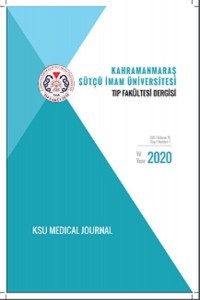Kronik Hepatit C Enfeksiyonlu Hastalarda İzole anti-HBc IgG Seropozitifliğinin Araştırılması
Kronik Hepatit C, Hepatit B koenfeksiyonu, izole Anti-HBc IgG seropozitifliği, HCV
Evaluation of Isolated Hepatitis B Core Antibody (Anti-Hbc Igg) Seropositivity in Chronic Hepatitis C Infected Patients
___
- 1. Ertekin V, Selimoğlu MA, Alp H. Erzurum’da 6-17 yaş grubu çocuklarda HBV infeksiyonu prevalansı çalışması sırasında saptanan atipik serolojik profiller. Viral Hepatit Derg. 2003;8(1):60-3.2. Raimondo G, Pollicino T, Cacciola I, Squadrito G. Occult hepatitis B virus infection. J Hepatol. 2007; 46(1): 160-70.3. Torbenson M, Thomas DL. Occult hepatitis B. Lancet Infect Dis. 2002; 2(8): 479-86.4. Allain JP. Occult hepatitis B virus infection: implications in transfusion. Vox Sang. 2004; 86(2): 83-91.5. Liu Z, Hou J. Hepatitis B virus and hepatitis C virus dual infection. Int Med Sci. 2006;3:57-62.6. Gltyson, JR Kramer, Z Duan, JA Davila. Prevalence and predictors of hepatitis B virus coinfection in a United States cohort of hepatitis C virus-infected patients . Hepatology. 2013; 58 (2): 538 - 45. 7. Aygen B, Çelen MK, Köksal İ, Tosun S, Karabay O,Yamazhan T,et al. The prevalence and epidemiological characteristics of hepatitis B virus and hepatitis C virus coinfection in Turkey. Turkiye Klinikleri J Med Sci. 2013; 33 (5): 1245-49. 8. Çetinkol Y, Yıldırım AA, Çalgın MK, Altındiş M. Atipik hepatit B serolojileri; retrospektif bir değerlendirme. Turk J Clin Lab. 2015;6:112-115.9. Mert A, Şentürk H, Süve İ ve ark. HbsAg, anti-HBs negatif, antiHBc pozitif olguların çeşitli yönlerden incelenmesi. Viral Hepatit Derg. 1996; 2: 92-5.10. Stroffolini T, Sagnelli E, Sagnelli C, Smedile A, Furlan C, Morisco F , et al. The burden of HBV infection in HCV patients in Italy and the risk of reactivation under DAA therapy. Dig Liver Dis. 2018. doi: 10.1016/j.dld.2018.09.010.11. da Silva EF, Mazo DF, Oliveira CP, Medeiros RP, Carrilho FJ, Pessôa MG. HAV and HBV seroprevalence in 1,000 patients with chronic HCV infection in a Tertiary Care Center in São Paulo, Brazil. Ann Hepatol. 2016;15(5):691-5. 12. Greub G, Frei PC. Isolated antibody to hepatitis B core is associated with hepatitis C virus co-infection. Clin Microbiol Infec .2000;6:629.13. Chlabicz S, Grzeszczuk A. Prevalence of hepatitis B markers in patients with hepatitis C infection in Northeastern Poland. Risk factors and vaccine use. Eur J Epidemiol. 2001; 17: 267-70.14. Jilg W, Sieger E, Zachoval R, Schatzl H. Individuals with antibodies against hepatitis B core antigen as the only serologycal marker for hepatitis B infection: high percentage of carriers of hepatitis B and C virus. J Hepatol. 1995; 23: 14-20.15. Demirtürk N, Demirdal T, Altındiş M, Aşçı Z. Hepatit C virüsü ile enfekte hastalarda hepatit A ve hepatit B virüs serolojileri. Ege Tıp Derg. 2007;46:97-100.16. Senturk H, Tahan V, Canbakan B, Dane F,Ulger Y, Ozaras Y, et al. Clinicopathologic features of dual chronic hepatitis B and C infection: a comparison with single hepatitis B, C and delta infections. Ann Hepatol. 2008; 7(1): 52-8.17. Akça F , Demir Akca AS , Aydemir S , Aktunç E. Kronik Hepatit C hastalarında Hepatit B enfeksiyonu ile karşılaşma sıklığı: Geriye dönük bir çalışma. Türk Aile Hek Derg. 2012;16(1):3-7.18. Yılmaz-Karadağ F. Hepatit C virüsü ile enfekte hastalarda Hepatit B seroprevalansının araştırılması. Turk Hıj Den Biyol Derg. 2017; 74(4): 287 – 92.19. Kucharska M, Inglot M, Szymczak A, Rymer W, Zalewska M, Malyszczak K, Zaleska-Dorobisz U, et al. Co-infection of the hepatitis C virus with other blood-borne and hepatotropic viruses among hemophilia patients in Poland. Hepat Mon. 2016; 16(9): e35658.20. Joller-Jamelka HI, Wicki AN, Grob PJ. Detection of HBs antigen in “anti-HBc alone” positive sera. J Hepatol. 1994; 21: 269-72.21. Sanchez-Quijano A, Jauregui JI, Leal M, et al. Hepatitis B virus occult infection in subjects with persistent isolated anti-HBc reactivity. J Hepatol.1993; 17: 288-93.22. Yang WT, Wu LW, Tseng TC, et al. Hepatitis B surface antigen loss and hepatocellular carcinoma development in patients with dual hepatitis B and C infection. Medicine (Baltimore). 2016; 95(10): e2995. 23. Besisik F, Karaca C, Akyuz F, Horosanli S, Onel D, Badur S, et al. Occult HBV infection and YMDD variants in hemodialysis patients with chronic HCV infection. J Hepatol. 2003; 38(4): 526-8.24. Göral V, Özkul H, Atmaca S, Şit D, Çelik M. Kronik HCV’li hemodiyaliz hastalarında occult HBV enfeksiyonu sıklığı. The Prevalence of Occult HBV Infection in Hemodialysis Patients with Chronic HCV Infection. Akademik Gastroenteroloji Derg. 2005; 4(2): 106-11.
- ISSN: 1303-6610
- Yayın Aralığı: Yılda 3 Sayı
- Başlangıç: 2004
- Yayıncı: Kahramanmaraş Sütçü İmam Üniversitesi
Ramazan Cahit TEMİZKAN, Muhammet Mesut Nezir ENGİN, Nursel BÜYÜK, Önder KILIÇASLAN, Şengül CANGÜR, Murat YILDIZ, Kenan KOCABAY
Nadir Yerleşimli Geniş Hacimli Keratokistik Odontojenik Tümör
Fatma BİLGEN, Alper URAL, Mehmet BEKERECİOĞLU
Kalvaryumda multifokal osteosarkom: Nadir bir vaka sunumu ve literatür derlemesi
Neslihan KURTUL, Nursel YURTTUTAN, A. Yasir BAHAR, Gökmen AKTAŞ
Muhammed Mehdi ÜREMİŞ, Nuray ÜREMİŞ
Kronik Hepatit C Enfeksiyonlu Hastalarda İzole anti-HBc IgG Seropozitifliğinin Araştırılması
Alper TAHMAZ, Sevil ALKAN ÇEVİKER, Özgür GÜNAL, Süleyman Sırrı KILIÇ
Hipertansiyon ve Erektil Disfonksiyon
Orçun ALTUNÖREN, Ertuğrul ERKEN, Özkan GÜNGÖR, Yasemin Coşkun YAVUZ
Alper URAL, Fatma BİLGEN, Abdülkadir Yasir BAHAR, Mehmet BEKERECİOĞLU
Farmakovijilans: Türk Mevzuatı Açısından Bir Değerlendirme
Kayseri İl Merkezinde Doğum Yapan Kadınların Doğum Öncesi Bakım Alma Durumu ve Etkileyen Faktörler
